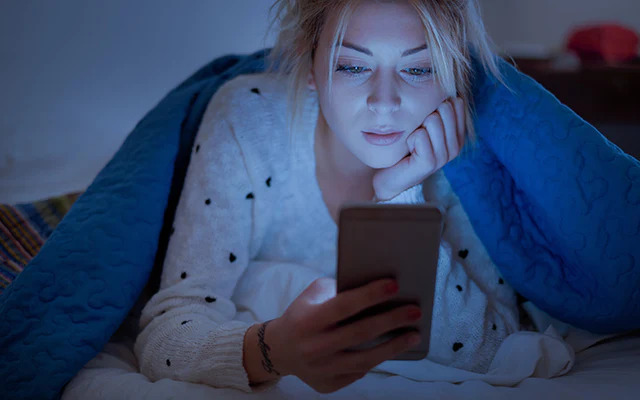n recent years, blue light protection has become a growing concern for skincare enthusiasts. With the rise of digital devices, we are exposed to blue light more than ever before, and research has shown that this type of light can have negative effects on our skin. In this blog post, we will explore what blue light is, how it affects our skin, and the different ways we can protect our skin from it.

What is Blue Light?
Blue light is a type of visible light that has a shorter wavelength and higher energy than other colors of light in the visible spectrum. It is found in natural sunlight, as well as in the artificial light emitted by digital devices such as smartphones, tablets, and laptops. Blue light has been shown to disrupt our circadian rhythm, or internal body clock, which can lead to problems with sleep and mood. It can also cause eye strain and fatigue when we spend too much time looking at screens.
How Blue Light Affects Our Skin
In addition to these issues, blue light can also have negative effects on our skin. Research has shown that blue light can penetrate deeper into the skin than UV rays, and can cause oxidative stress, which can lead to premature aging. This is because blue light can generate free radicals, which can damage the skin’s collagen and elastin fibers, leading to wrinkles and fine lines. Blue light can also cause hyperpigmentation and dark spots on the skin.
One of the ways blue light can affect our skin is through the production of melanin. Melanin is the pigment that gives our skin its color, and it is produced in response to UV radiation. However, research has shown that blue light can also stimulate the production of melanin, which can lead to uneven skin tone and dark spots.
Blue light can also affect the skin’s microbiome, which is the community of bacteria that live on our skin. Our skin microbiome plays an important role in maintaining healthy skin, and disruptions to this microbiome can lead to issues such as acne and rosacea. Research has shown that blue light can alter the composition of the skin’s microbiome, leading to imbalances that can contribute to these skin conditions.
How to Protect Your Skin From Blue Light
Given the negative effects that blue light can have on our skin, it is important to take steps to protect our skin from this type of light. Here are some of the ways you can do this:
- Wear Sunscreen
While sunscreen is typically associated with protecting the skin from UV rays, many sunscreens also provide protection against blue light. Look for a sunscreen that contains physical blockers such as zinc oxide or titanium dioxide, which can help to reflect blue light away from the skin. Some sunscreens also contain antioxidants, which can help to neutralize the free radicals generated by blue light.
- Use Blue Light Blocking Skincare Products
Another way to protect your skin from blue light is to use skincare products that contain ingredients that can help to block this type of light. One such ingredient is iron oxide, which can help to absorb blue light and prevent it from penetrating the skin. Other ingredients that can provide blue light protection include niacinamide, which has been shown to reduce the production of melanin in response to blue light, and vitamin E, which can help to neutralize the free radicals generated by blue light.
- Take Breaks from Screens
One of the simplest ways to protect your skin from blue light is to take breaks from screens. Try to take regular breaks throughout the day to give your eyes and skin a rest from the blue light emitted by digital devices. You can also adjust the settings on your devices to reduce the amount of blue light they emit, such as by using the “Night Shift” setting on iPhones or the “Night Light” setting on Windows computers.
- Use Blue Light Blocking Glasses
Another way to protect your skin from blue light is to use blue light blocking glasses. These glasses have lenses that are designed to filter out blue light, reducing the amount of exposure your eyes and skin receive. This can be especially helpful for people who spend a lot of time working on computers or using other digital devices.
- Practice Good Skincare Habits
Finally, it is important to practice good skincare habits to keep your skin healthy and resilient against the effects of blue light. This includes things like washing your face twice a day, using a moisturizer to keep your skin hydrated, and avoiding smoking and excessive alcohol consumption, which can contribute to premature aging.
In conclusion, blue light protection is an important consideration for anyone who wants to keep their skin healthy and youthful-looking. By understanding how blue light affects the skin and taking steps to protect against it, you can help to reduce the risk of premature aging, hyperpigmentation, and other skin issues. Whether you choose to wear sunscreen, use blue light blocking skincare products, or take regular breaks from screens, there are many different strategies you can use to protect your skin from this type of light. So if you want to keep your skin looking its best, start incorporating blue light protection into your skincare routine today.
